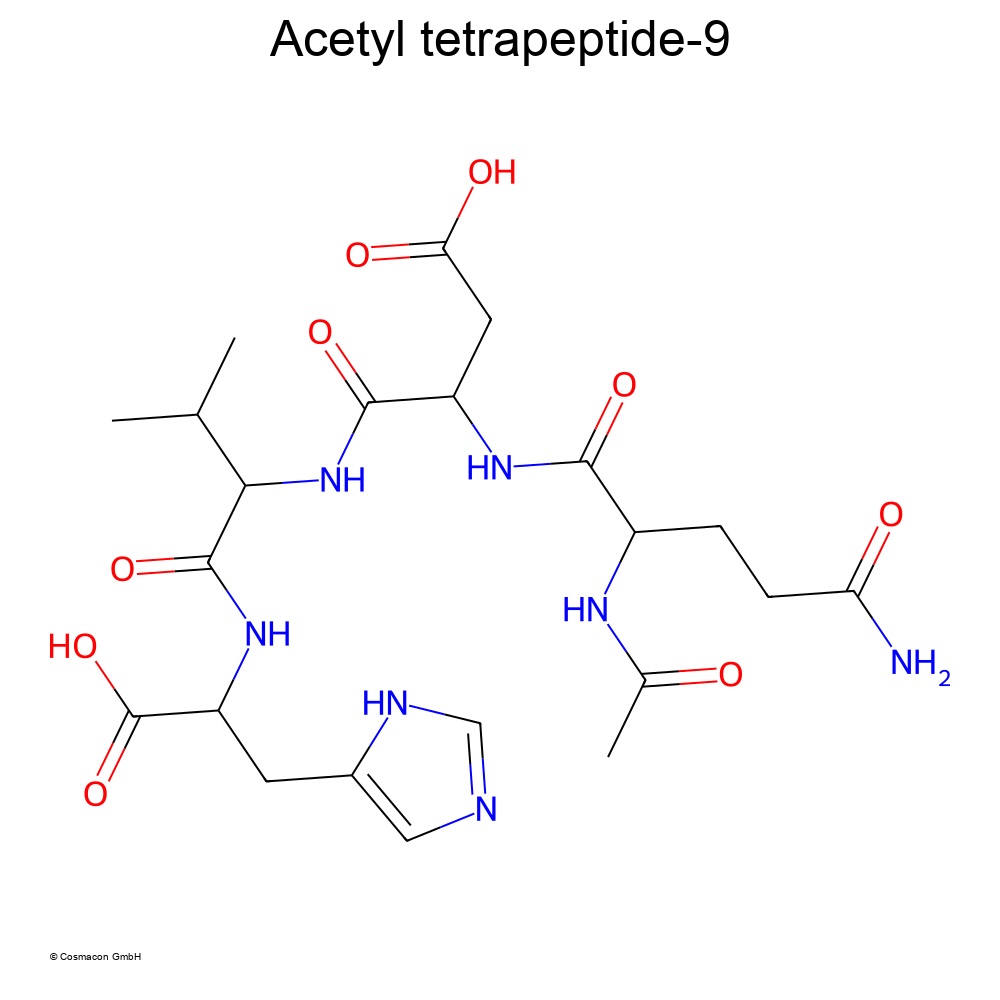Acetyl Tetrapeptide-9: The Collagen Peptide

In modern cosmetics, peptides are becoming more and more important because they can target skin problems and improve skin structure in the long term. One of these promising active ingredients is acetyl tetrapeptide-9, which is characterized by its positive properties in the field of anti-aging and skin tightening care. In this article, we take a detailed look at the physico-chemical properties, efficacy results, advantages, disadvantages and ideal applications of this innovative active ingredient.
Physico-chemical properties of acetyl tetrapeptide-9
Acetyl tetrapeptide-9 is a synthetic tetrapeptide with the following physico-chemical properties:
INCI name: Acetyl Tetrapeptide-9
CAS number: 928006-50-2
Molecular structure: Peptide sequence with acetyl modification for stabilization
Purity: ≥98.0 %
Appearance: White to off-white powder
Solubility: Soluble in water
Recommended Use Level: 0.0007 – 0.13 %
Efficacy Results and Optimal Concentration
Acetyl Tetrapeptide-9 has a proven ability to significantly increase collagen production and improve skin structure. In particular, it promotes the synthesis of lumican, an important proteoglycan that is crucial for collagen fiber formation and skin firmness. Studies show:
115% increase in lumican synthesis compared to the control group
Increased dermal density, resulting in firmer and more elastic skin
Recommended concentration for cosmetic products is between 0.0007 – 0.13 %, depending on the product formulation
What is lumican?
Lumican is a small leucine-rich proteoglycan (SLRP) that plays an important role in the structure and function of connective tissue. It is mainly found in the extracellular matrix (ECM) of skin, cornea, tendons and cartilage, where it is involved in the organization and stabilization of collagen fibers.
Through this property, lumican contributes to the strength and elasticity of the tissue. In addition, it influences cell migration, tissue regeneration and wound healing, which is why it is also of interest for regenerative and anti-aging cosmetics.
Studies suggest that lumican may be involved in regulating skin aging because it affects collagen architecture, thus contributing to skin firmness and resilience. In research, lumican is also studied in the context of wound healing, inflammatory processes, and even carcinogenesis because it is involved in controlling cell behavior.
Benefits of Acetyl Tetrapeptide-9
The use of Acetyl Tetrapeptide-9 in skin care products has numerous advantages:
Increased skin firmness: The enhanced collagen production improves the skin structure.
Skin tightening: The stimulation of proteoglycans leads to increased dermal density.
Anti-aging effect: Reduction of fine lines and improvement of skin elasticity.
Good tolerability: Due to the skin-like peptide structure, the product is suitable for sensitive skin.
Water solubility: easy to integrate into various cosmetic formulations.
Disadvantages of Acetyl Tetrapeptide-9
Despite its many advantages, there are also some aspects to consider when using Acetyl Tetrapeptide-9:
Cost-intensive: Since it is a specialized peptide active ingredient, formulating high-quality products can be expensive.
Long-term use required: Visible results require continuous use over several weeks.
Stability: Peptides can be sensitive to pH levels and high temperatures, which is why a suitable formulation is crucial.
Ideal applications in cosmetic products
Acetyl Tetrapeptide-9 is ideal for various skin care products with anti-aging and skin firming effects. Here are some application ideas:
Anti-aging serums: highly concentrated serums for targeted wrinkle reduction and skin firming.
Day and night creams: for continuous care and strengthening of the skin structure.
Eye creams: reduces fine lines and tightens the delicate skin around the eyes.
Lifting masks: for an instant, intense effect that visibly firms the skin.
BB and CC creams: in decorative cosmetics to combine care and coverage.
Conclusion
Acetyl Tetrapeptide-9 is a promising active ingredient in modern skin care that impresses with its unique effect on collagen and proteoglycan synthesis. Due to its multiple benefits, it is particularly suitable for anti-aging products that aim to improve skin elasticity and firmness. Please feel free to contact us. We would be happy to develop innovative formulations with this active ingredient to create high-quality skin care products for your brand.
Literature:
Usage of Synthetic Peptides in Cosmetics for Sensitive Skin.
Resende DISP, Ferreira MS, Sousa-Lobo JM, Sousa E, Almeida IF.Pharmaceuticals (Basel). 2021 Jul 21;14(8):702